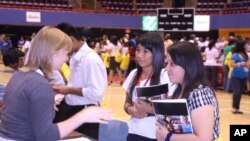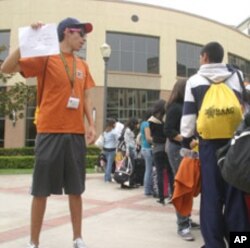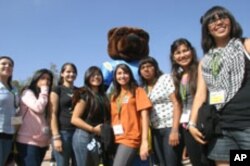Latinos are the fastest growing segment of the U.S. population but Latino students are the least likely to get college degrees.
According to the Hispanic College Fund, that's mainly because of the lack of role models, poverty and being unprepared to navigate through the American educational system.
Providing tools
The nonprofit Hispanic College Fund (HCF) is working to change that by providing Latino youth with the information and tools they need to pursue a college degree in order to become more competitive in the 21st century economy.
University of Maryland freshman Karen Guzman has big plans for her future.
"I'm actually trying to [get a] double degree in computer science and psychology, with a minor in Latin American studies." The 18-year-old says her dreams have become possible thanks to a scholarship from the Hispanic College Fund, which is dedicated to developing the next generation of Hispanic professionals.
Guzman says she was inspired to pursue a college education three years ago after attending one of HCF's programs, a four-day Hispanic youth symposium.
Reaching out
"That was the first time I saw so many young Latinos like me saying, 'I'm here in college and you can do it,' because before that I didn't have that, I guess, role model to look up to," she says. "Everyone I knew was either dropping out or their plans were not to go to college."
Robert Arenas, Jr., attended a Hispanic youth symposium last summer where he heard from Latin professionals.
"They said they went to college," he says. "It gave me hope. I say, 'They did it, so I can do it, too.' I hope someday, once I have a career and everything, to come back to the Hispanic youth symposium and talk to those kids just like what those guys did to me."
The 17-year-old is now a high school senior. His father says the symposium inspired his son and filled him with hope and determination.
"You cannot believe it. When Robert came back, he was another boy," he says. "He was so happy."
Big dreams
Like many other Hispanic parents who immigrated to the United States, Robert Arenas, Sr. doesn't know much about the U.S. educational system. Yet, he says, he knows a college degree is essential if his son is to have a better future.
"I want to see Robert, my son, like Ms. Sotomayor," he says, referring to the first Latina Supreme Court Justice. "So we say, 'Robert I'm working so hard, your Mom and myself, so you have to go to college. You have to go to the university, to get a degree in something. That's the only way you can reward us.'"
The Hispanic College Fund fills the gap for students like Robert and Karen - whose parents realize how important higher education is but are unable to guide them through the process. The fund was established six years ago to give young Latinos the information they need to apply for college and the self esteem to succeed once they get there. Program founder George Cushman says many young Hispanics think they are not smart enough to go to college.
Investing in the future
"What we have to do is change that thinking completely because these kids are fantastic," says Cushman. "In Virginia, I had a number of students come up to me when they found out that I had actually set this program up and they said, 'Thank you for believing in us.'"
Cushman believes motivating and helping Hispanic youth get college degrees is an investment in the future of both the students and the nation.
"In America, there's many people like me in their 50s and 60s. They are highly educated. They are the engineers, the doctors, the lawyers, the health care professionals, the teachers. They are all hitting the exit doors because it's time to retire soon," he says. "The largest fastest-growing student population to follow in our footsteps is Hispanic, but they're getting college degrees late.You can feel the vacuum forming. If we don't fix that, it's going to hurt the economy. It's going to hurt the security of the country."
The symposiums are just the first step of HCF's program to help Latino students succeed in their professional lives.
"Once our students have gone through that, they then have year-round programming through the Hispanic Youth Institute," says Anne Guarnera, a fund spokesperson. "So that helps us to support them as they move along and get closer to actually going to college. Once in college, with a scholarship program, that supports students financially as well as emotionally and helps them with the process of integrating into their schools."
"It was amazing," says Karen Guzman, who also took part in the youth Institute. "We got to go to different companies, talk to different people in different fields and get mentors. We keep in touch. My mentor still tells me, 'Apply to this program,' 'How are you doing in your classes?' So I know someone cares for me, someone who is not just like 'I'm here,' then they never keep the communication. They are there constantly."
With the guidance of successful professionals and the help of the Hispanic College Fund network, Guzman says she feels all doors are open to her. Now it's up to her to work hard and achieve her dreams - for herself, for her parents who never went to college, and for those students who will follow in her footsteps.







